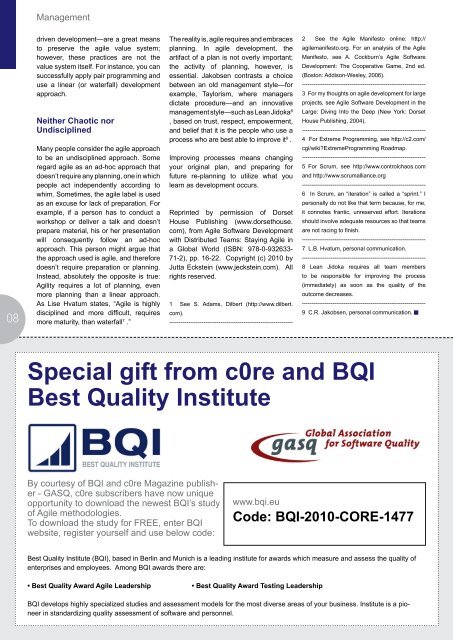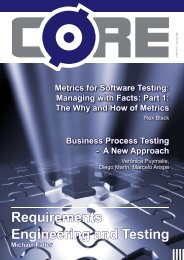Comparison of Change Management Systems
Comparison of Change Management Systems
Comparison of Change Management Systems
Create successful ePaper yourself
Turn your PDF publications into a flip-book with our unique Google optimized e-Paper software.
08<br />
<strong>Management</strong><br />
driven development—are a great means<br />
to preserve the agile value system;<br />
however, these practices are not the<br />
value system itself. For instance, you can<br />
successfully apply pair programming and<br />
use a linear (or waterfall) development<br />
approach.<br />
Neither Chaotic nor<br />
Undisciplined<br />
Many people consider the agile approach<br />
to be an undisciplined approach. Some<br />
regard agile as an ad-hoc approach that<br />
doesn’t require any planning, one in which<br />
people act independently according to<br />
whim. Sometimes, the agile label is used<br />
as an excuse for lack <strong>of</strong> preparation. For<br />
example, if a person has to conduct a<br />
workshop or deliver a talk and doesn’t<br />
prepare material, his or her presentation<br />
will consequently follow an ad-hoc<br />
approach. This person might argue that<br />
the approach used is agile, and therefore<br />
doesn’t require preparation or planning.<br />
Instead, absolutely the opposite is true:<br />
Agility requires a lot <strong>of</strong> planning, even<br />
more planning than a linear approach.<br />
As Lise Hvatum states, “Agile is highly<br />
disciplined and more difficult, requires<br />
more maturity, than waterfall 7 .”<br />
By courtesy <strong>of</strong> BQI and c0re Magazine publisher<br />
- GASQ, c0re subscribers have now unique<br />
opportunity to download the newest BQI’s study<br />
<strong>of</strong> Agile methodologies.<br />
To download the study for FREE, enter BQI<br />
website, register yourself and use below code:<br />
The reality is, agile requires and embraces<br />
planning. In agile development, the<br />
artifact <strong>of</strong> a plan is not overly important;<br />
the activity <strong>of</strong> planning, however, is<br />
essential. Jakobsen contrasts a choice<br />
between an old management style—for<br />
example, Taylorism, where managers<br />
dictate procedure—and an innovative<br />
management style—such as Lean Jidoka 8<br />
, based on trust, respect, empowerment,<br />
and belief that it is the people who use a<br />
process who are best able to improve it 9 .<br />
Improving processes means changing<br />
your original plan, and preparing for<br />
future re-planning to utilize what you<br />
learn as development occurs.<br />
Reprinted by permission <strong>of</strong> Dorset<br />
House Publishing (www.dorsethouse.<br />
com), from Agile S<strong>of</strong>tware Development<br />
with Distributed Teams: Staying Agile in<br />
a Global World (ISBN: 978-0-932633-<br />
71-2), pp. 16-22. Copyright (c) 2010 by<br />
Jutta Eckstein (www.jeckstein.com). All<br />
rights reserved.<br />
1 See S. Adams, Dilbert (http://www.dilbert.<br />
com).<br />
-----------------------------------------------------------------<br />
2 See the Agile Manifesto online: http://<br />
agilemanifesto.org. For an analysis <strong>of</strong> the Agile<br />
Manifesto, see A. Cockburn’s Agile S<strong>of</strong>tware<br />
Development: The Cooperative Game, 2nd ed.<br />
(Boston: Addison-Wesley, 2006).<br />
-----------------------------------------------------------------<br />
3 For my thoughts on agile development for large<br />
projects, see Agile S<strong>of</strong>tware Development in the<br />
Large: Diving Into the Deep (New York: Dorset<br />
House Publishing, 2004).<br />
-----------------------------------------------------------------<br />
4 For Extreme Programming, see http://c2.com/<br />
cgi/wiki?ExtremeProgramming Roadmap.<br />
-----------------------------------------------------------------<br />
5 For Scrum, see http://www.controlchaos.com<br />
and http://www.scrumalliance.org<br />
-----------------------------------------------------------------<br />
6 In Scrum, an “iteration” is called a “sprint.” I<br />
personally do not like that term because, for me,<br />
it connotes frantic, unreserved effort. Iterations<br />
should involve adequate resources so that teams<br />
are not racing to finish.<br />
-----------------------------------------------------------------<br />
7 L.B. Hvatum, personal communication.<br />
-----------------------------------------------------------------<br />
8 Lean Jidoka requires all team members<br />
to be responsible for improving the process<br />
(immediately) as soon as the quality <strong>of</strong> the<br />
outcome decreases.<br />
-----------------------------------------------------------------<br />
9 C.R. Jakobsen, personal communication.<br />
Special gift from c0re and BQI<br />
Best Quality Institute<br />
www.bqi.eu<br />
Code: BQI-2010-CORE-1477<br />
Best Quality Institute (BQI), based in Berlin and Munich is a leading institute for awards which measure and assess the quality <strong>of</strong><br />
enterprises and employees. Among BQI awards there are:<br />
• Best Quality Award Agile Leadership • Best Quality Award Testing Leadership<br />
BQI develops highly specialized studies and assessment models for the most diverse areas <strong>of</strong> your business. Institute is a pioneer<br />
in standardizing quality assessment <strong>of</strong> s<strong>of</strong>tware and personnel.



